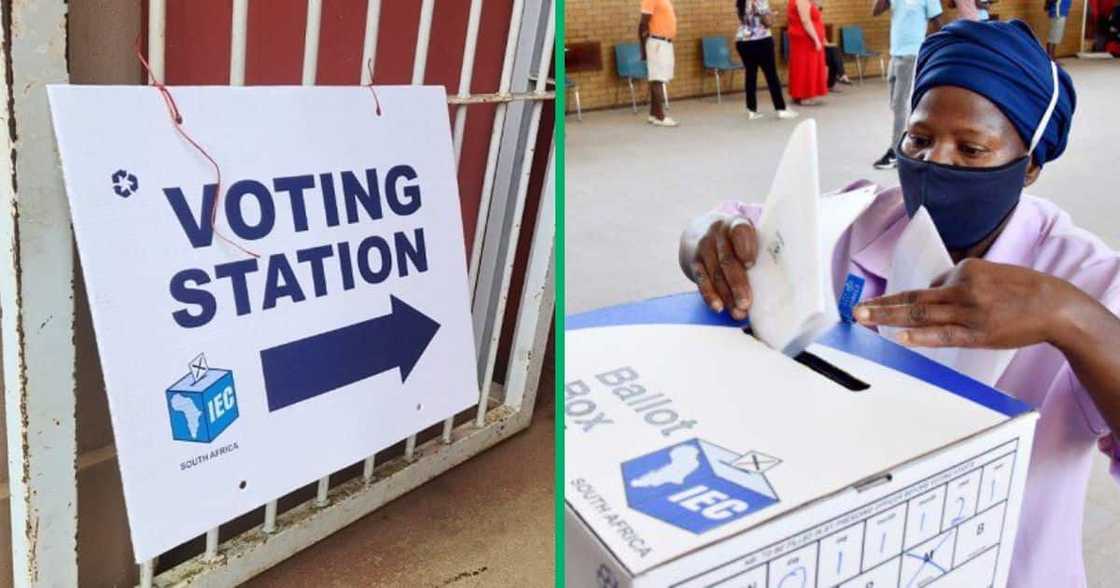IEC Explains Third Ballot Paper in Landmark Electoral Change Amidst Fear of Voter Education
- The IEC has introduced a third ballot paper in a landmark electoral change
- With just a few weeks to go until the 29 May General Election 2024, the change has sparked a debate about voter education
- The IEC's Sy Mamabolo says they are fostering an informed electorate through robust education campaigns
PAY ATTENTION: Let yourself be inspired by real people who go beyond the ordinary! Subscribe and watch our new shows on Briefly TV Life now!

Source: Getty Images
In a historic development marking a significant shift in South Africa's electoral landscape, the Independent Electoral Commission (IEC) has implemented a third ballot paper for the upcoming national and provincial elections.
This sparked a debate about whether this was done at the right time and if there was ample time for voter education.
Groundbreaking change
The Constitutional Court's judgment allowed the participation of independent candidates to reshape the democratic process and necessitate comprehensive voter education initiatives.
PAY ATTENTION: stay informed and follow us on Google News!
Political analyst Arthur Shopola underscored the profound implications of this change, emphasising that the timing of the election pales compared to the imperative of ensuring voters understand the intricacies of the new three-ballot system.
Shopola highlighted the vital role of education programmes facilitated by the IEC and urged collaboration with political parties and citizen-led initiatives to enhance voter awareness.
"Considering this court verdict and the significance of elections for people's lives within the democratic system, the question of timing has little to no value.
"The question should be around the extent and impact of education programs facilitated by IEC to ensure that people understand the three ballot systems. I have seen some of these education campaigns through television adverts and other media platforms.
"However, with the assistance of political parties, much can still be done to ensure that voters are covered. Citizen-to-citizen education should also be encouraged; each one teaches one principle."
Timing of the third ballot paper
Election Management Consulting Agency of Africa CEO Lulu White said South Africa's electoral landscape has undergone a significant transformation with the recent introduction of the third ballot paper, a consequence of the Electoral Amendment Act passed in April of the previous year.
She said this amendment marked a groundbreaking shift, allowing independent candidates to contest in the regional tier of the National Assembly and Provincial Legislatures, a privilege previously unavailable to South African voters.
"Before this landmark amendment, the electoral system in South Africa did not permit voters to cast their ballots for independent candidates in National and Provincial Elections, limiting their choices to established political parties.
"However, the timing of this amendment has been a subject of debate. Critics argue that it was rushed, being implemented less than a year before the national election.
"Furthermore, legal challenges against certain provisions within the amendment resulted in additional delays, raising concerns about the adequacy of the preparation and consultation processes.
"A critical question arises: are voters adequately informed about the mechanics of the regional ballot? Despite efforts to educate the electorate, much voter education for this election was conducted online, potentially excluding a significant portion of the population without internet access.
"Consequently, many voters may need to comprehend the purpose and significance of the new ballot fully. Nonetheless, South African citizens have historically demonstrated a strong understanding of the electoral process, with spoiled ballots typically amounting to less than 1 percent in previous elections."
White also noted that introducing three third ballot papers signifies a significant milestone in South Africa's electoral evolution, promising greater inclusivity and representation.
"However, ensuring that voters are adequately informed about the new electoral process remains crucial to maintaining the integrity and efficacy of the democratic system."
IEC addresses the third ballot
IEC CEO Sy Mamabolo emphasised the importance of meticulous consideration when marking each of the three ballot papers.
Mamabolo cautioned voters against marking multiple choices per ballot, stressing that doing so would invalidate the vote. He elaborated on each ballot paper's configuration, detailing their distinct roles in the electoral process.
The national ballot, Mamabolo explained, features a list of political parties vying for the 200 seats in the National Assembly, with 52 parties competing in a dual-column format.
"The regional ballot enables voters to elect representatives for each province in the National Assembly, accommodating both political parties and independent candidates.
"The provincial ballot, unique to each province, allows voters to choose their representatives in the respective provincial legislatures, with a varying number of contestants ranging from 24 to 45."
Voter education campaigns
As South Africa embarks on this unprecedented electoral journey, Mamabolo affirmed the IEC's commitment to fostering an informed electorate through robust education campaigns.
Collaborative efforts between the IEC, political parties, and grassroots initiatives are poised to empower citizens with the knowledge needed to navigate the intricacies of the three-ballot system effectively.
IEC says General Election 2024 won't be postponed
In a similar report, Briefly News reported the potential financial implications of postponing the upcoming elections, estimated a staggering cost exceeding R500 million.
This revelation comes as the IEC filed papers in the Constitutional Court, countering an application submitted by the newly established Labour Party of South Africa.
PAY ATTENTION: Сheck out news that is picked exactly for YOU - click on “Recommended for you” and enjoy!
Source: Briefly News

